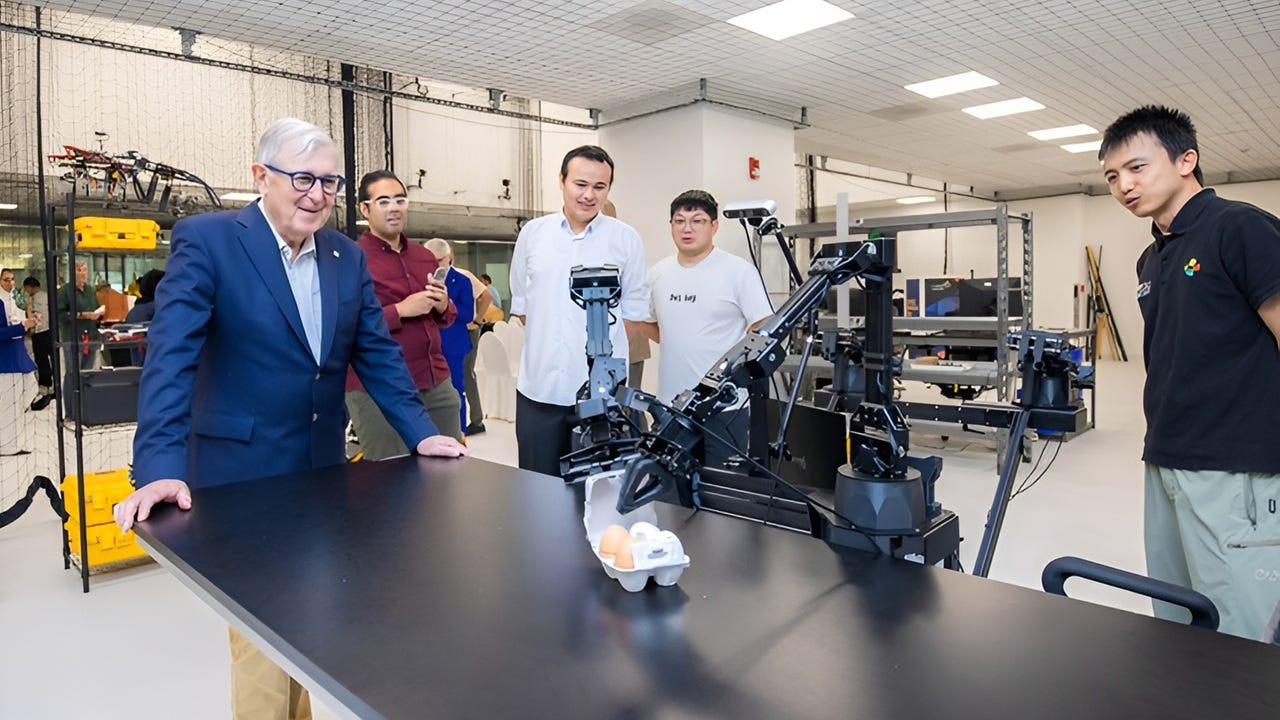KAUST opens 1,000-square-metre robotics research facility
New research centre targets smart cities and autonomous mobility

#SaudiArabia #robotics - Saudi Arabia research university King Abdullah University of Science and Technology (KAUST) has launched the Robotics Bay, a 1,000-square-metre purpose-built facility for designing, testing and prototyping advanced robotic and autonomous systems. Inaugurated this month on the university’s campus, the interdisciplinary research facility strengthens the Kingdom’s capabilities in robotics and AI. Supervised by KAUST Electrical and Computer Engineering faculty members Professor Eric Feron and Assistant Professor Shinkyu Park, the facility provides infrastructure for aerial, ground and underwater robotic platforms, supporting research across smart cities, autonomous mobility, advanced infrastructure and public services relevant to the Kingdom’s giga-projects.
SO WHAT? - The new robotics facility continues KAUST’s investments in infrastructure to develop domestic AI and robotics expertise and capability. By providing world-class research infrastructure comparable to leading robotics centres such as those of the University of California San Diego, California Institute of Technology and University of Michigan, KAUST positions Saudi Arabia to compete globally in high-tech sectors. The Robotics Bay will serve as a training ground for the next generation of robotics and AI specialists.
Here are some key details about the new robotics facility:
King Abdullah University of Science and Technology (KAUST) has launched the Robotics Bay, a 1,000-square-metre purpose-built facility for designing, testing and prototyping advanced robotic and autonomous systems.
Research at the Robotics Bay covers diverse applications ranging from agile ground and aerial robots to human-robot collaboration, multi-robot swarms and robotics for marine operations.
The Robotics Bay is available to KAUST faculty, students and collaborators across disciplines, whilst also welcoming national partners seeking to develop and test robotic systems in collaboration with the university’s research teams.
The facility’s centrpiece is a high-bay arena for aerial and ground robot trials surrounded by specialised laboratories supporting faculty-led exploration and development, designed to accommodate multiple robotic systems simultaneously in a single integrated environment.
Supervised by KAUST Electrical and Computer Engineering faculty members Professor Eric Feron and Assistant Professor Shinkyu Park, the facility provides infrastructure for aerial, ground and underwater robotic platforms, supporting research across smart cities, autonomous mobility, advanced infrastructure and public services relevant to the Kingdom’s giga-projects.
Infrastructure includes 400-volt electrical outlets to accommodate energy-intensive robotic systems, a motion-capture system and dedicated flight zones enabling experiments with drones and multi-agent systems, plus support for robotic manipulators, autonomous fleets and underwater vehicles.
Prototyping tools including 3D printers, computer numerical control machines and soldering stations provide resources for developing next-generation intelligent machines.
The facility’s location on KAUST’s campus connects it with the university’s Future Mobility Sandbox, the world’s first multimodal testing ground for mobility technologies across land, air and sea, enabling researchers to test scaled-down concepts before outdoor deployment.
ZOOM OUT - Saudi Arabia has accelerated investment in advanced technology research infrastructure as part of Vision 2030’s push to develop knowledge-based industries beyond hydrocarbons. Established in 2009 as a graduate research university, KAUST has positioned itself as a catalyst for innovation and economic development, bringing together international faculty and researchers to address challenges in food, health, water, energy, environment and digital domains whilst building domestic expertise in advanced technology sectors.
[Written and edited with the assistance of AI]

